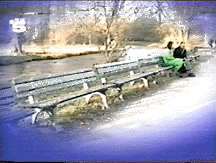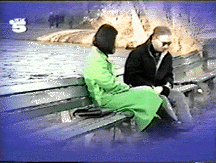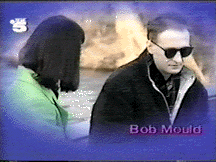Unidentified female reporter (same one who earlier interviewed Grant): We are not afraid of subzero temperatures* here at Tele 5! Here beside me Bob Mould is trembling.
Bob Mould: Hi.
Reporter: There's one question I've had on my mind a long time and I think Bob Mould can answer it best: why are there so many bands that start out playing noise and thrash, then after a while reorientate themselves to more melodies and harmonies. What do you think is the reason?
Reporter: Was that maybe a reason for the Hüsker Dü breakup? That they didn't want to be the wild boys any more?

Reporter: But you don't look back in anger, right?
Bob No, but the last few months were really difficult. We had a lot of fighting and arguments. We kept trying to resolve our differences, but it was like a marriage that's gone bad. You reach a point where you have to break up. It's no good to be bitter; there were a lot of positive things over the years.
Reporter But you have a song on your new album called "Poison Years." Isn't that a kind of retrospective?

Reporter You're a hero to a lot of younger bands. Yopur style of guitar-playing was very influential. Do you listen to any of them?
Reporter Are you a folk musician underneath, inside you? Workbook sounds folky I think
Bob Yes. Workbook was the first opportunity to show people how my songs are actually written. With Hüsker Dü we composed a lot of songs on acoustic instruments, but performed them on electric ones—that was our style. On my new album, you can hear the basic instruments too: [something about "Whichever Way The Wind Blows" was lost here.] A song like "Sinners An Their Repentances," wherer it was written on acoustic guitar, that would be the presentation. I think what happens is that it just gives it a more personal feel, at least for me, and I'm hoping that translates to the listener as well—that this is the way the song was conceived. As for folk music, everybody does folk music. I think that for people to claim that popular music is anything but folk music is a little pretentious.
Bob It's a long thing. I moved up there right before the Hüsker Dü split. I wanted to isolate from city life and the social scene, and from the music business in general. It had become real aggravating. I was beginning to forget why I liked music at all.
Reporter Where do you think music is headed in the next decade

Reporter You live in New York now?
Bob I'm living in New York now, in a small apartment; I sold my farm. I'm living there to gather ideas for songs. New York is pretty exciting for me at the moment. Lots of things are going on right now and we're real excited about it—the possibility of collaborating with a lot of people on different projects, even some from the movie industry. I can do a lot of things there that I couldn't do in Minneapolis; I spent 11 years there, and most people knew me for only one thing. So, I think to move away you can sort of re-establish yourself any way that you want, and take on a new personality.
Reporter Thank you! I wish you luck.
Bob Bye bye.